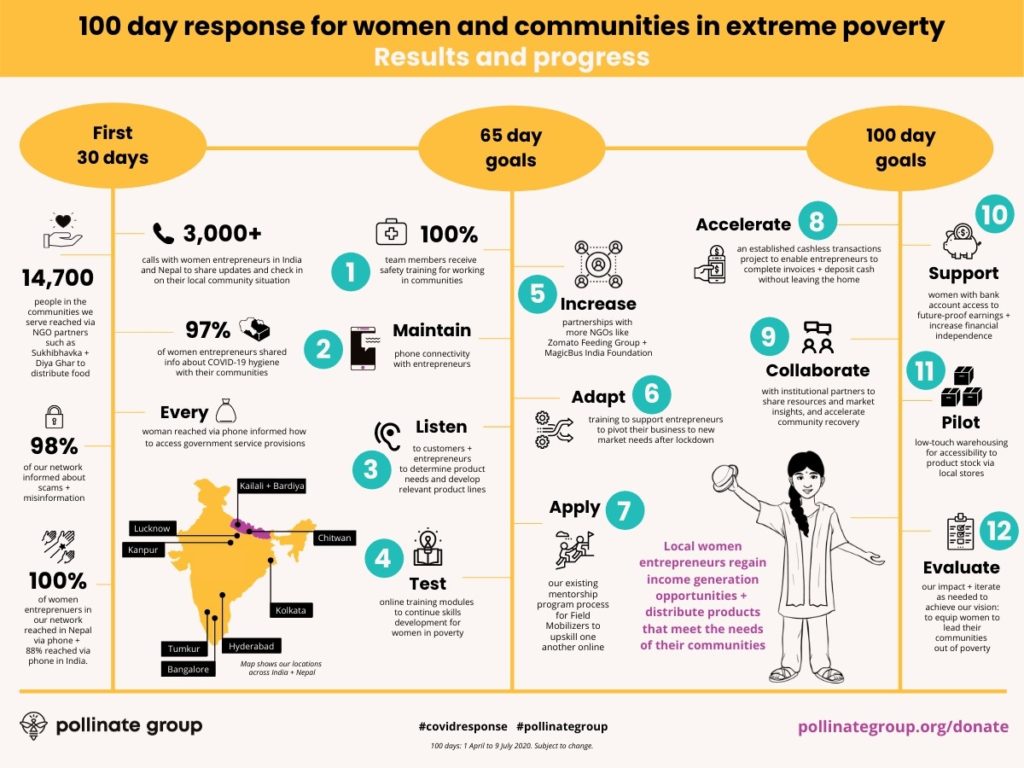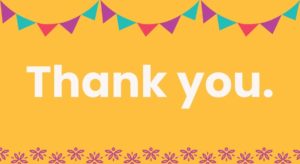On 6 April 2020 Pollinate Group launched a 100 day response to the issues and challenges presented with COVID-19. Our response had three key themes:
- Immediate support for our women-led, last mile distribution network and communities during lockdowns in India and Nepal.
- Keep our team safe, transitioning to working from home and adapting our approach to prepare for a low touch economy.
- Position ourselves on the front foot, to proactively accelerate projects that ensure women entrepreneurs can continue to distribute products to their peers that improve health, save time and save money.
Thanks to the enormous generosity of our supporters who gave for our 100 day response, Pollinate Group closed our biggest ever fundraising campaign on 30 June, raising an incredible $133,000.
With sales in India and Nepal dropping to nothing and our Fellowship programs suspended, we were reliant on philanthropic funds. From Day 31 to Day 100, our supporters made it possible for us to achieve the following results and progress, all aligned with our vision to equip women to lead their communities out of poverty.

1. Team safety
- Reminded all team members frequently about the symptoms and precautions, with masks and gloves mandatory when moving around.
- Hosted well-being sessions to address the mental and physical health impacts of COVID-19.
2. Maintain connectivity with entrepreneurs
- Continue to contact our Suryamukhis (women entrepreneurs) via telephone with response rates at 85%.
- Help identify new business opportunities for Suryamukhis in their local community, including changes to her location and related market changes.
3. Listen to customers
- Undertook a survey of more than 1,000 customers in May 2020.
- The survey, as well as growing customer enquiries to our distribution network, proves there is an immediate demand for household products that improve health, save time and save money for marginalized communities.
4. Test online training
- Engaged a service provider for online training software.
- Identified requirements with focus on Suryamukhis who would not be familiar with such a platform.
5. Increase partnerships
- Continued to work with our wonderful partners, as well as new business partners, who we thank for all their support and encouragement.
- Working with Pothole Raja in Bangalore to obtain a database of jobs for community members, mainly in the construction sector.
6. Adapt training for market needs
- Collected data on market needs to inform future training including considerations of migration, community size and location, and product demands.
- Created training content for product-specific training, and prepared refreshers on sales and marketing for Suryamukhis.
7. Apply mentorship program to upskill Field Managers
- Our Nepal team ran a peer to peer mentorship program.
- We combined India and Nepal field managers into one team and created consistency across tracking and activities.
8. Accelerate cashless transactions
- Area Managers in Nepal are using mobile payment apps successfully.
- Also working with the UNSW Maker Games team to develop an easy-to-use mobile app for entrepreneurs to track their sales, invoices and earnings.
- Women who do not own smartphones can safely deposit money at their nearest collection centre.
9. Collaborate with institutional partners
- Discussions with key organizations in India to connect women entrepreneurship based social organizations.
- Participated in the Miller Center for Social Entrepreneurship’s Crisis Management Business Planning Program, as well as a Global Distributors Collective webinar Fundraising in the face of COVID-19.
10. Support women with bank account access
- Identified women in our network with and without bank accounts, and with and without smartphones.
- Integrated the scope of this work into our cashless transactions project.
11. Pilot low-touch warehousing
- From selling a handful of products in Nepal and no products in India during April and May, we sold 475 products in June (purely from existing customers’ requests).
- We moved existing stock from offices to a distributor warehouse, to reduce the time and effort of Area Managers handling products and redirecting that time and effort to supporting women entrepreneurs.
12. Evaluate our impact
- Encourage our team and network to share stories, including Bahatum in Lucknow and entrepreneurs in Nepal.
- Enabled staff with a data pack on their phone to upload real time, quantitative data from the field.
- Our biennial Impact Assessment Report 2018-2020 scheduled for publication before the end of 2020.
Pollinate Group is in a good position to ride out the challenges of this year, and our mission is more relevant than ever. As India and Nepal emerge from a three month lockdown, we are slowly and safely re-entering the neglected communities we serve.
To keep up with the latest updates on our work, if you haven’t already, subscribe to our newsletter.

